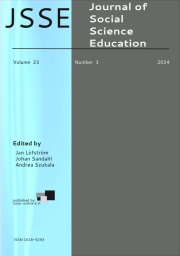Ultra-Orthodox female student teachers' motivation to learn and teach global education
DOI:
https://doi.org/10.11576/jsse-6802Keywords:
citizenship, globalization, global education, religion, ultra-orthodoxAbstract
Highlights:
– GE can be embraced by distinct populations with highly religious views.
– UOSTs' motivation toward GE is related to competitive-instrumental, social-justice, and personal factors.
– UOSTs prioritize local orientation toward GE, over global perspectives.
– UOSTs seem to assess the compatibility of GE with the traditions and norms of their own community.
– GE may be perceived as multidirectional and multidimensional rather than a top-down hierarchy
Purpose: This study aims to identify factors that motivate ultra-Orthodox female student-teachers to learn and teach from a global education perspective. Uncovering these factors may inform the discourse on integrating global orientations into education systems.
Design/methodology/approach: The study adopts the broad theoretical idea of global education while employing quantitative analysis.
Findings: Data obtained from 115 participants yielded three factors salient to learning GE: (1) competitive-instrumental; (2) social-justice related; and (3) personal. Motivation to teach GE was found to align with two main approaches, one locally oriented and the other globally oriented.
Research limitations/implications: As the study adopted a quantitative methodology, future research should also elucidate our findings using qualitative methods.
Practical implications: Stakeholders who wish to promote global education should consider that the participants’ overall disposition is congenial to global education; however, they interpret this notion in local and personal terms rather than as a global, proactive framework.
Downloads
Published
How to Cite
Issue
Section
License
Copyright (c) 2024 JSSE - Journal of Social Science Education

This work is licensed under a Creative Commons Attribution-ShareAlike 4.0 International License.



